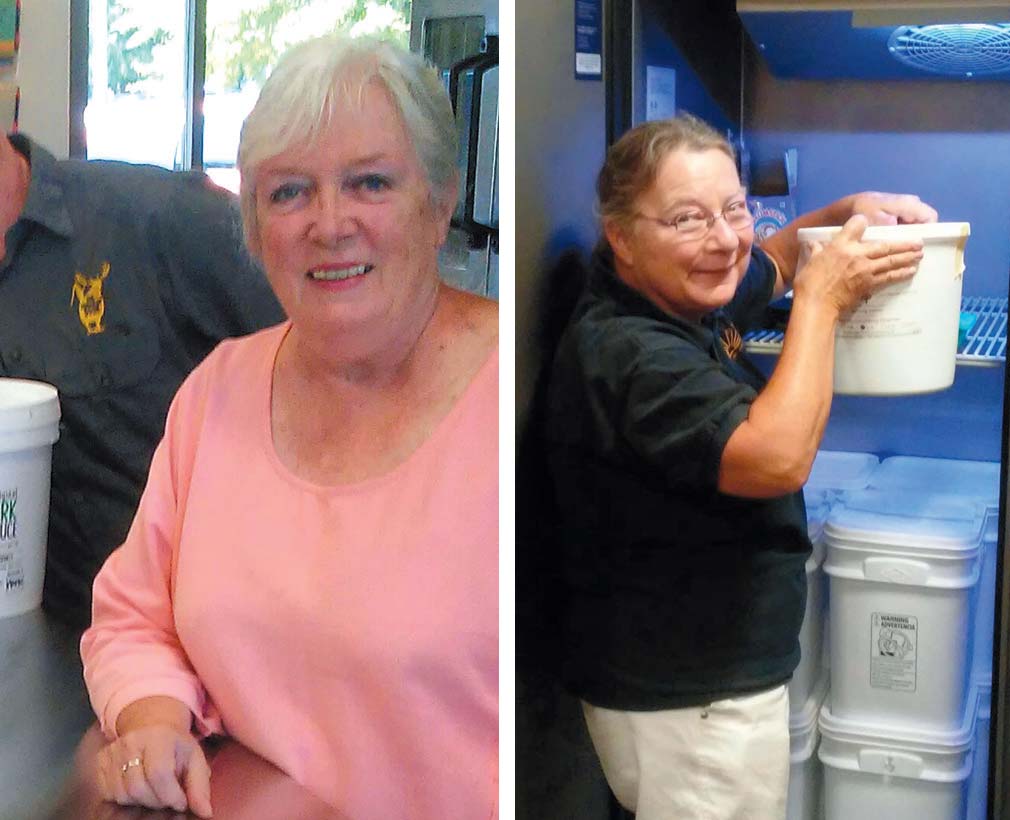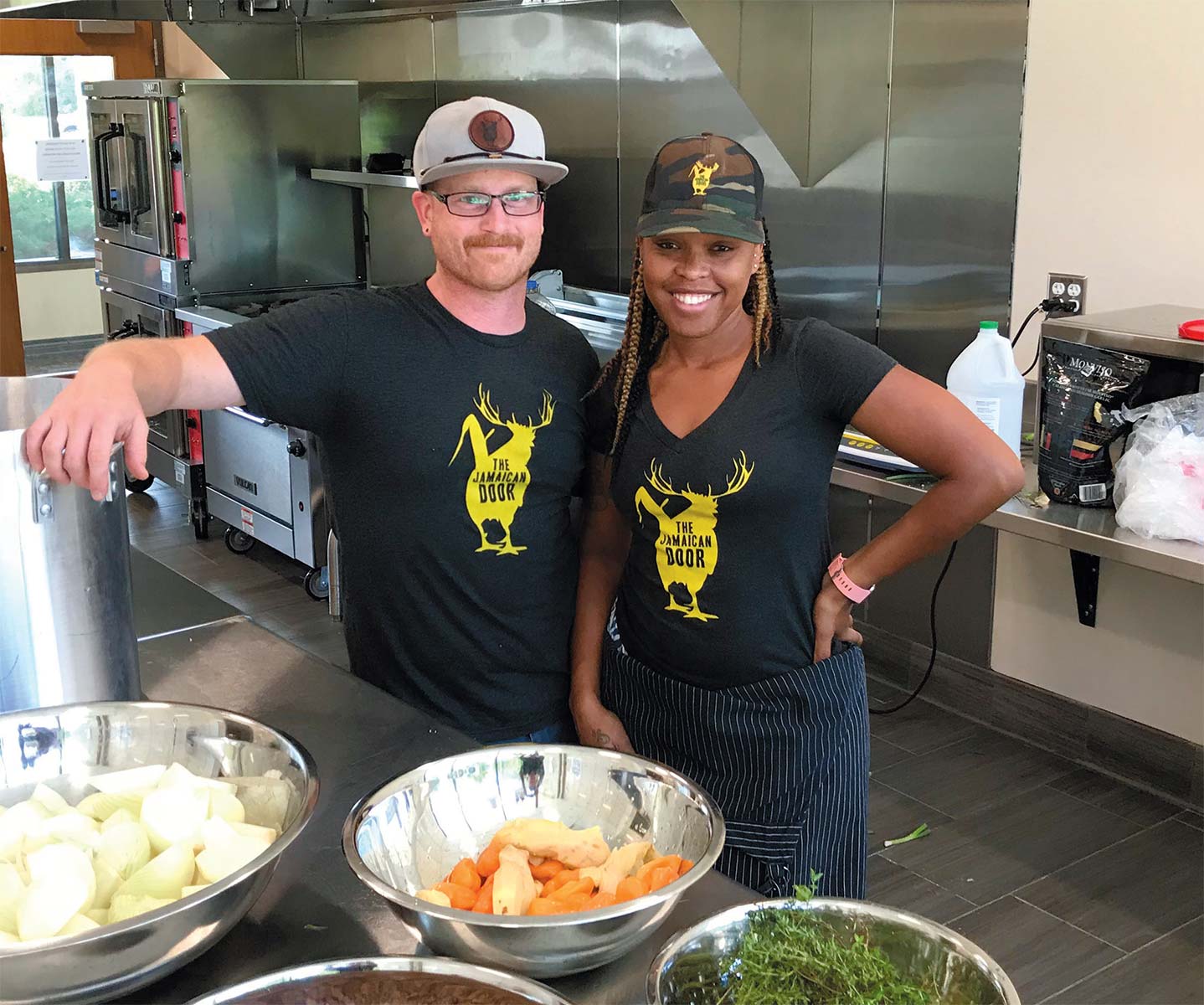Fortunate Timing for NWTC Kitchen Tenants
SCENT OF JAMAICAN SAUCE WAFFLING THROUGH NEW SISTER BAY CENTER
Georgina and Carlin Hatch's decaled, caramel-brown and canary-yellow business van is not putting as many miles on its tires compared to this time last year.
The opening of a Northeast Wisconsin Technical College center in the spring of 2018 to serve northern Door County was a big day not only for the Green Bay-based vocational school, but also for the Hatches. The occasion meant their Jamaican Door company, a small manufacturer of authentic jerk meat sauces, no longer had to hit the road for Algoma or Sturgeon Bay to prepare its canned batches of pork and chicken seasonings and marinades.
“It's the raw sauce, real, not the prettied-up kind of deal but what you would find on a roadside in Jamaica,” said Georgina Hatch, a native of the Caribbean island nation. “I tried to find jerk sauce around here and it just wasn't the same, so I called my brother-in-law back home and asked for his recipe. Then we would start having friends over for jerk chicken and they would ask for the sauce recipe. (The business) just evolved from there.” “When they're making their stuff, I love going over there to smell,” said center director Lisa Tetzloff. “It's a really nice, almond-spice smell.”
The launch of the satellite facility – formally called the NWTC Learning and Innovation Center – will be instrumental in Jamaican Door's continued growth.
The regional center, inside a former Nicolet Bank branch on South Bay Shore Drive (Wisconsin 42), offers a number of educational choices in business, economics, psychology, sociology and other traditional coursework toward an associate degree. But it also has a foodie laboratory, a full-scale commercial kitchen tailored to furthering the northern Peninsula's entrepreneurial culture, namely in the food service and hospitality area.
“It helps us overcome a lot of adversity,” said Hatch, who opened Jamaican Door with her husband in 2015. “We do not have to travel as far to produce our sauce. Otherwise we would somehow have to build (an expensive) commercial kitchen.” How many drive-time hours and odometer miles did she and Carlin log previously?
"Oh, my gosh. Coming every other week for a big block of time...?" Georgina replied, noting she needs to set aside five hours per processing session. You do the math for the roughly 100-mile round trip from northern Door to Algoma. Algoma had been home until 2016 to the nonprofit Farm Market Kitchen, which for 17 years provided orchard owners, small farmers and aspiring bakers and cooks a place to prepare their products.
The site served as a “food incubator,” turning full-baked ideas into delectable items for store shelves, farm markets and direct sales without the costly overhead of meeting state licensing requirements for a commercial kitchen or, if needed, a warehouse. Besides shared rental space, Farm Market Kitchen – like traditional business incubators in other sectors of the economy – provided technical help with issues like patenting and business advice to get its food-processor tenants off to a healthy start. Farm Market Kitchen closed two years ago when its nonprofit parent company folded as revenue demands outstripped supplies. At that time, Jamaican Door moved its processing operations to the commercial kitchen at the NWTC campus in Sturgeon Bay, still a good-sized commute from their home in Ephraim.
“It was tough (going to Algoma); our family was a lot younger then,” Hatch said. “But thankfully we had Mary Pat there.”
That would be Mary Pat Carlson, the original director of Farm Market Kitchen who founded it as a place to make jellies from her family's Island View Orchard between Sister Bay and Ellison Bay. The Algoma spot was chosen so it could become a central, regional resource for food innovators from Door, Brown, Kewaunee and Manitowoc counties and beyond.
The Northern Door center near the tip of the Peninsula would have a difficult time fulfilling that same role. But there's certainly a critical mass of nearby skill and interest in the food industry to make up the difference. "(Carlson) has tons of knowledge. We're lucky to have her in Northern Door,” said Stephanie Cataldo Pabich, the offi ce assistant/kitchen manager in Sister Bay.
At Algoma, Carlson had a “co-packer” arrangement with the Hatches. After signing a confidentiality agreement to prevent the sharing of trade secrets, she could aid them with the processing, packaging and delivery – helping drive the Jamaican spices up to Sister Bay and dropping them off on her ride home.
Penny Lane Farm of Baileys Harbor, another user of the NWTC kitchen, experienced the potential pitfalls of its long-distance relationship with the former Algoma facility.
“One time I forgot the cherries and had to go all the way back,” said owner JoAnne Penny, who puts out a line of sweet and sour, Thai and southeast Asian sauces she developed a taste for while she and husband Jim worked as University of Pennsylvania archaeologists in that part of the world 40 years ago.
Her business started as a part-time venture in 2005, then grew to full-time 10 years later when Penny retired as office manager at Scandia Village Good Samaritan Retirement Center. She hit upon the idea, and learned the benefits of the incubator approach, upon seeing a billboard about Farm Market Kitchen during a drive to Green Bay.
“I saw it as a way to make extra money,” Penny said. “We didn't have a co-packing (deal), but (Carlson) helped me through all the hurdles. I had been making these sauces for myself fresh, but I would come home from work and think, ‘I wish I had a jar of this or that’ and then started thinking I could easily can those myself.”
Penny is licensed to warehouse her inventory at home, where it can keep for about two years. She said she needs to carve out about five or six processing days in the winter to build up enough stores for the summer, not surprisingly her busiest retail season.

Left: Mary Pat Carlson. Right: JoAnne Penny finding ingredients in a cooler housed in the old Nicolet Bank vault.
At its height about a decade ago, Farm Market Kitchen served about 50 customers at a time and a waiting list of about 10 more that eventually would be “guided out of the nest” in Carlson's words. More than 250 small businesses took root there.
Today, Carlson works in a similar mentoring role for the NWTC kitchen and as a small food-processing specialist for UW-Extension. She also manages the kitchen at Curative Connections in Green Bay.
“I teach people how to learn (about the business),” Carlson said, befitting someone with a whopping 10 teaching certifi cates ranging from preschool to nutrition. “There are lots of restrictions to trying to do (food processing) on your own. You have to register with the FDA, and you have to meet every requirement that the big, mega-manufacturing ones do.
The only hardship exemption (for small companies) is with some labeling requirements, but a lot of our small processors choose to follow those anyway, since many of them have an emphasis on organic and nutritional value (of their wares).”
Carlson is client as well as counselor, utilizing the center’s services for her Wildwood Farm Market located on her husband's family orchard. The farm has a colorful history dating to 1846 – two years before Wisconsin statehood – a story whose characters include German POW cherry pickers during World War II and migrant workers without whom it “would not have survived,” Carlson said.
The market sells jams and pie fillings from the cherry trees’ bounty and also carries pickles, relishes, bakery, candles, fudge and a wide selection of seasonal produce.
Carlson estimated that, if a nearby incubator weren't available, someone starting a commercial kitchen would be looking at a “minimum” $9,000 to $10,000 investment upfront. A restaurant-sized, overhead ventilation hood alone can run $2,000 or more.
By contrast, the NWTC kitchen rents for either $15 or $10 per hour, the lower rate kicking in if a user occupies it more than 20 hours per month, Cataldo Pabich said. New companies are also charged a one-time fee of $150 that includes business consulting.
If those fledgling firms choose to continue the arrangement, the annual fee afterward is $50. That’s what the current three tenants paid, since they all were established and did not require the higher-cost startup advice. The kitchen features two convection ovens; a braising counter with 40-gallon pan that can also do double duty as a canning station; a 20-quart mixer; and a conventional range/oven. The former bank's vault houses the coolers, freezers and wheeled storage shelves for non-perishable ingredients and completed creations.
At an all-purpose business incubator – an example can be found in the Sturgeon Bay Industrial Park – the goal for tenant and landlord alike is for the business to at some point move all of its operations out into the community once it’s found its legs. So far, NWTC hasn’t put any such restrictions on its clients, seeing that it has plenty of capacity as a relatively new startup venture itself and that the very purpose was to avoid the costly burden of a full-scale kitchen.
“If it pays to expand the footprint of the business (they could graduate); in the meantime they have these services available,” Carlson said. “Either way, they are still going to need these support services and it then becomes an incubator without walls. Yes, they might ‘graduate’ but they don't just get kicked out into a void.”
“A lot of (our tenants) could turn out to be just seasonal, like when the cherries come in in July," Tetzloff said, referencing Door County's most well-known cooking ingredient.
Without a year-round presence, a seasonal tenant would have fewer time and space demands that might otherwise force it to move out eventually – although things might get pretty cramped during the late July cherry harvest.
The processors get round-the-clock access to the kitchen through a hotel-like swipe key. Penny has been known to come in during the weekends and Carlson in the evenings.
As for down the road, NWTC would like to introduce culinary classes at the Sister Bay location. Two videoconference courses on food-service sanitation are already scheduled for November and December, as well as a general marketing class next fall that could benefi t the processors or any type of enterprise.
Also, Tetzloff said, an established restaurant could use NWTC as a place to experiment with new menu items, work on specialty dishes or serve as prepping headquarters for catering.
Carlson is the only one of the three current tenants with a brick-andmortar retail store.
But all three processors are regular vendors at area farmers markets, and products from Penny Lane and the Hatches can be found at numerous retail shops from Door County south to Green Bay and Madison. Jamaican Door also hosts popular cookouts Saturday evenings at Good Eggs in Ephraim.
Penny Lane's sauces spice up the chicken wings and wraps at the A.C. Tap south of Sister Bay, owned by JoAnne's brother Steve Mueller. And Jamaican Door supplies the sauce for the jerk chicken at Husby's Food & Spirits in Sister Bay, where Carlin Hatch works part-time as a server.
NWTC bought the building from Nicolet Bank for the relatively bargain price of just under $300,000. The school then spent about a half-million on design and renovations, a good portion of it for additional plumbing that is more crucial in the food-service industry than banking.






